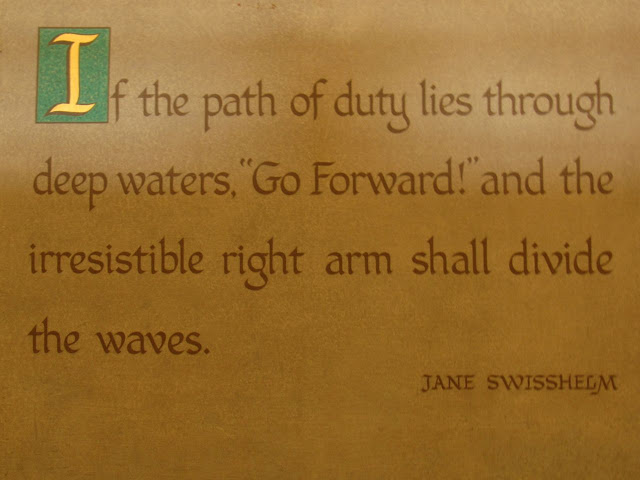 |
| Memorial Hall, Pennsylvania State Museum, Harrisburg, Pennsylvania, 21 October 2015. |
This year's BPE sessions took place in the Pennsylvania State Museum building, and attendees repeatedly passed through the Museum's Memorial Hall, which is dedicated to the vision of Pennsylvania founder William Penn as they made their way from one session to the next. Memorial Hall features a mammoth, strikingly modernist sculpture of Penn, a reproduction of Pennsylvania's original colonial charter, and a mural by Vincent Maragliotti depicting the state's history from the colonial era to the mid-1960s.
Painted beneath the mural are quotations from over a dozen prominent Pennsylvanians. I scanned them this morning as I was heading to a session, and several of them seemed strikingly resonant.
The BPE exists because archivists, librarians, and other people recognize that the processes and policies that worked so well in an analog world don't work so well in the digital era. This year, many presenters detailed how they're developing and documenting new processing workflows and drafting new preservation and records management policies. We're creating these things not because we wish to sow discord or promote ourselves but because our mission -- preserving and providing state government and other born-digital content -- demands it of us.
BPE attendees have always stressed that failure can be just as instructive as success, and Kate Theimer stressed in her plenary address that we need to create organizational cultures in which failure is recognized as part and parcel of innovation. I would argue that demonstrating a certain degree of compassion is part and parcel of this effort. Most of the people who self-select to become archivists and librarians were conscientious students who took pride in having the "right" answer, and we have to keep gently reminding our perfectionist peers that failure itself is neither unusual nor a sign of incompetence. Failure to learn from a failure is far more damaging.
I don't know whether the "irresistible right arm shall divide the waves," but as Pennsylvania State University records manager Jackie Esposito emphasized in this morning's plenary address, those of us who are actively grappling with digital preservation and electronic records management are doing so in part because the risks associated with not doing so -- financial losses, legal sanctions, tarnished institutional reputations, inability to conduct business -- are even greater than the risks associated with wading into the deep waters of digital preservation and electronic records management. We don't have any choice but to keep going forward, even if the only right -- or left -- arms pushing against the waves are our own.










